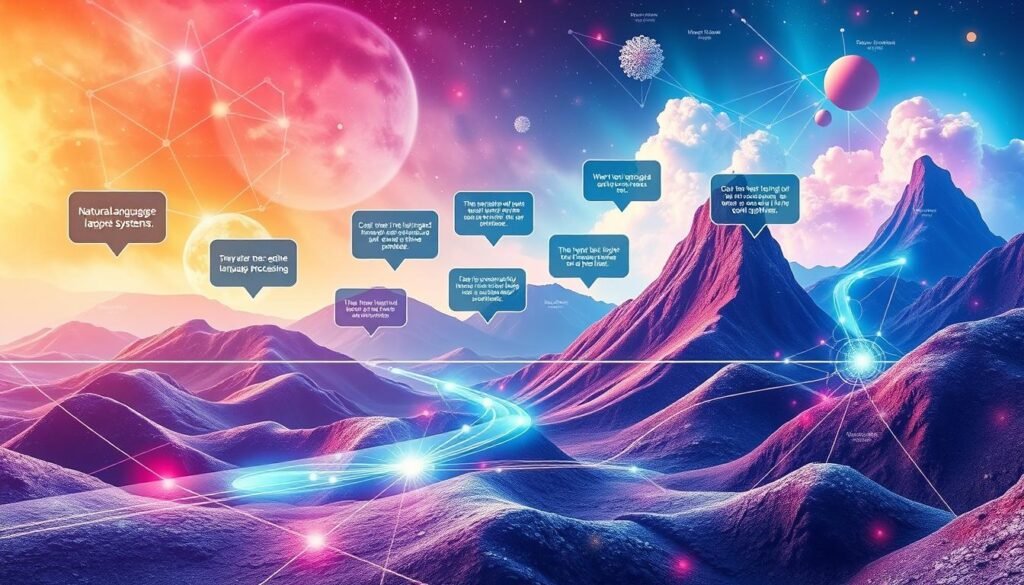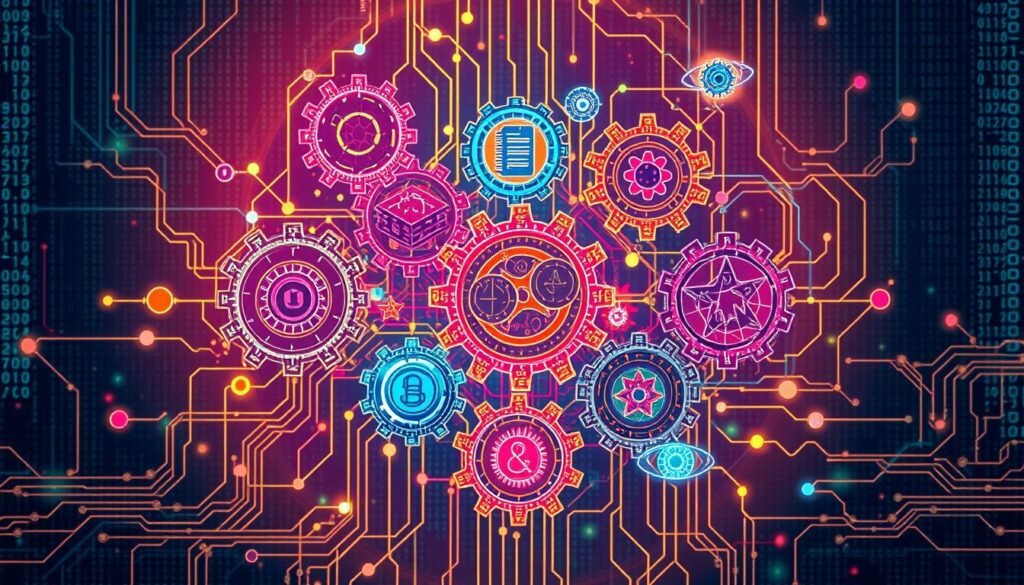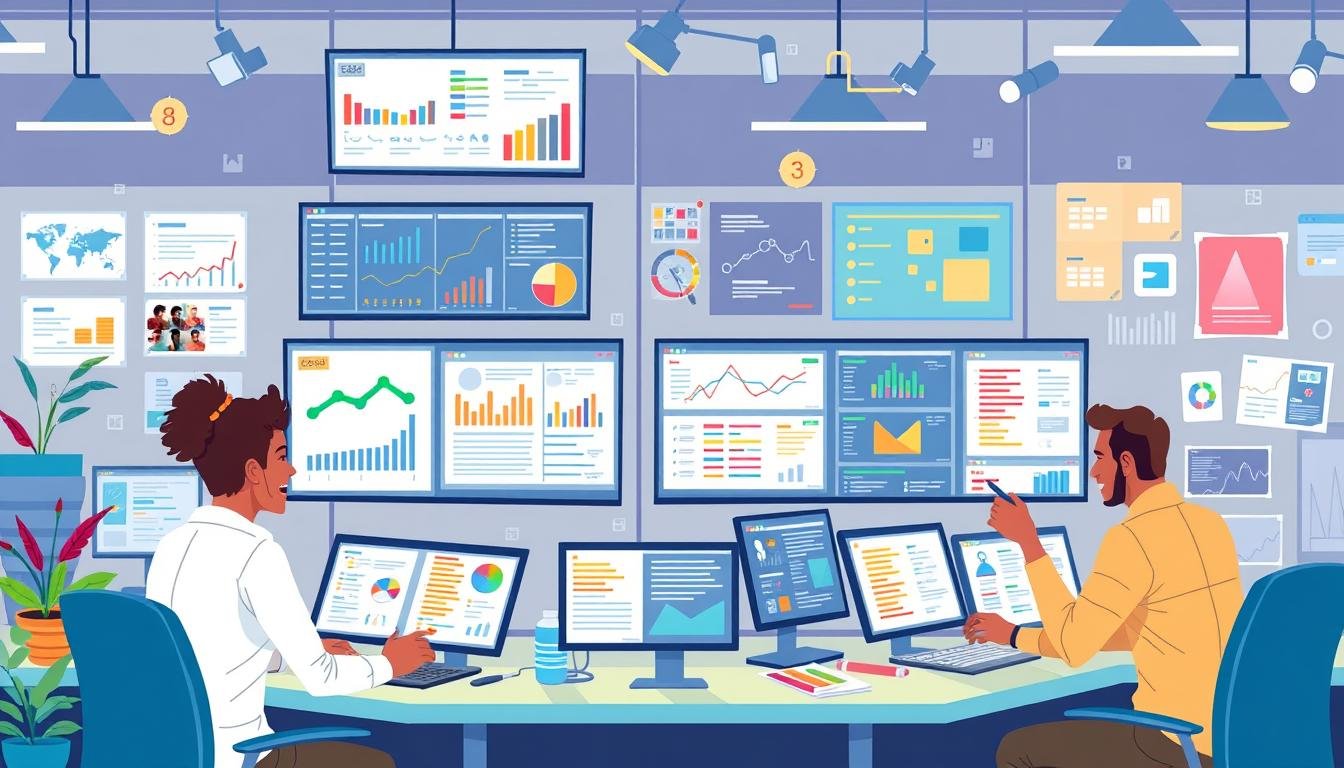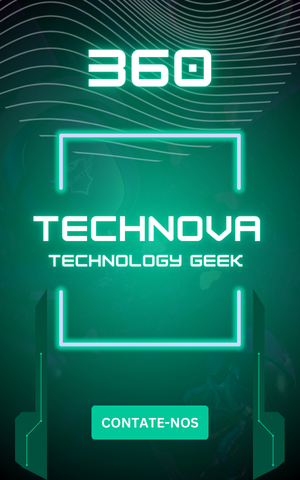Natural language processing (NLP) has changed how computers talk to us. It lets machines understand and speak like humans. This field uses special tech to make computers smart about language.
Thanks to NLP, many areas are getting better. It helps with tasks that used to take a lot of time. It also makes content that feels like it was written by a person, making things easier and more efficient.
This article looks at how NLP is changing our digital lives. We’ll see how it has grown, what it’s made of, and how it’s changing the world. Understanding NLP helps us see the future of technology, where things are smarter and more tailored to us.
Key Takeaways
- Natural language processing (NLP) enables computers to understand and generate human language, revolutionizing modern technology.
- NLP combines computational linguistics, machine learning, and deep learning to power a wide range of applications, from text summarization to sentiment analysis.
- NLP plays a growing role in enterprise solutions, automating tasks, enhancing data analysis, and improving search capabilities.
- Advancements in NLP have led to the creation of complex tools like chatbots and voice-activated assistants, transforming how we interact with technology.
- The NLP market is expected to experience significant growth in the coming years, driven by the increasing demand for AI and NLP-based solutions.
Introduction to Natural Language Processing
Definition and Overview of NLP
Natural Language Processing (NLP) is a field that combines computer science, artificial intelligence, and linguistics. It lets computers understand and make sense of human language. This has changed how we use technology.
NLP uses machine learning and deep learning to help computers understand text and speech. It lets machines grasp the complexity of human language. This goes beyond what traditional programming can do.
The Importance of NLP in Today’s World
NLP is very important today because of the fast pace of technology. It helps with many things like search engines and virtual assistants. It also helps with text summarization and understanding how people feel.
NLP makes it easier for humans and machines to talk to each other. This has changed many industries and how we live and work. It’s making our digital world better.
- NLP is key in retail and medicine, improving customer service and healthcare.
- Advanced chatbots like GPT-3 can create clear and useful text. This is changing virtual assistants.
- Big tech companies like Google and Facebook use NLP to make search better and find hate speech.
NLP is growing fast, and its uses are endless. It promises a future where humans and machines work together smoothly.
The Evolution of Natural Language Processing
Natural language processing (NLP) has changed a lot over the years. It has moved from simple rules to complex deep learning models. This change is thanks to more data, better computers, and new algorithms. Now, NLP is a key part of today’s technology.
In the early 2000s and 2010s, NLP got a big boost from machine learning and new algorithms. The market for NLP is expected to grow to $92.7 billion by 2028. This shows how important NLP is becoming in many fields.
The Transformer model was introduced in 2017. It made data processing better and improved NLP’s performance. This model helped with language translation, understanding feelings in text, and summarizing texts.
Today, NLP is used in many ways, like chatbots, finding information, and understanding speech. It also helps with language translation. Google’s BERT and other models have made machines understand text better by knowing the context.
New ways to summarize text are making information easier to get. Also, NLP can now work in many languages and understand feelings in text. This makes NLP useful for people all over the world.
The future of NLP looks even brighter. Deep learning, learning from different types of data, and learning to transfer skills will lead to more progress. As NLP gets better, it will change many industries. It will make our interactions with technology better and open up new possibilities.

| Milestone | Year | Impact |
|---|---|---|
| Incorporation of machine learning techniques | 2000s-2010s | Significant advancements in NLP, leading to a projected market growth of $92.7 billion by 2028 |
| Introduction of the Transformer model | 2017 | Optimized data processing and enhanced overall NLP performance, enabling groundbreaking applications |
| Integration of Artificial Intelligence (AI) in NLP | Present | Revolutionized human-machine interactions, with Google’s BERT and language transformers improving text understanding |
NLP has come a long way, with big steps in technology, algorithms, and how we process data. As it keeps getting better, we’ll see even more ways it will change how we use technology and interact with the world.
Main Components of NLP
Natural language processing (NLP) is a field that mixes computational linguistics and machine learning. It helps computers understand and create human language well. This is done with great accuracy and speed.
Computational Linguistics
Computational linguistics is key in NLP. It uses data science and statistics to deeply study language and speech. It looks at how words and sentences mean things, and what’s really being said.
Machine Learning and Deep Learning
Machine learning and deep learning are also important in NLP. They help NLP models get better at tasks like understanding text and creating language. These methods let NLP systems learn and get smarter over time.
| NLP Component | Description |
|---|---|
| Computational Linguistics | Analyzes language and speech using data science and statistical methods, including syntactical and semantic analysis. |
| Machine Learning and Deep Learning | Leverages advanced algorithms to enable NLP models to learn from large datasets, continuously improving performance in tasks like text classification and language generation. |
“Natural language processing is the cornerstone of modern technology, enabling seamless communication between humans and machines.”
Key NLP Tasks and Applications
Natural language processing (NLP) lets machines understand human language. It’s a powerful field that changes how we use technology. Let’s look at some key NLP tasks and their uses in the real world.
Sentiment Analysis
Sentiment analysis is a key NLP task. It helps machines find emotions and opinions in text. This is very useful for businesses.
It lets them understand what customers think and what’s happening in the market. By looking at social media and reviews, businesses can make better choices and improve how they serve customers.
Text Summarization
Text summarization is another important NLP task. It makes it easy to get the main points from long texts. This saves a lot of time and effort.
It’s great for journalists, students, and lawyers. They often have to deal with a lot of information. Summarization helps them focus on what’s important.
Machine Translation
Machine translation is a core NLP task. It translates text or speech from one language to another. This makes it easier for people to work together, no matter where they are from.
The growth of NLP towards Natural Language Understanding (NLU) is also important. It helps algorithms understand human language in different areas, like medicine and law.
NLP is getting better and better. It’s changing how we use technology and understand text. From analyzing feelings to summarizing texts and translating languages, NLP is making a big difference.

The Role of Natural Language Processing in Modern Technology
Natural language processing (NLP) is key in today’s tech world. It changes how we talk to machines and brings new ideas to many fields. NLP helps us get info, automate tasks, and make smart choices with data.
NLP lets machines understand and talk like humans. This makes talking to tech easier and more natural. Now, we have virtual assistants and chatbots that can understand us better.
NLP does more than just help with virtual helpers. It changes how we work in healthcare and finance. It helps us find important info, do repetitive tasks, and understand big data. This makes businesses work better and faster.
NLP is getting even more important in tech. It mixes human language with machine smarts. This creates a smarter digital world that changes how we live and work.

“Natural language processing is the key to unlocking the true potential of artificial intelligence and enabling more natural, intuitive interactions between humans and machines.”
- NLP powers virtual assistants and chatbots for more intuitive user experiences.
- NLP enables automated text summarization, sentiment analysis, and language translation.
- NLP optimizes business processes and decision-making across various industries.
- NLP facilitates the development of more intelligent and user-friendly technology.
NLP’s effect on tech is clear. As it grows, we’ll see even more amazing tech changes. These changes will change how we use and interact with technology in the future.
NLP in Enterprise Solutions
Natural language processing (NLP) is changing how businesses work. It automates tasks and gives better data insights. This helps companies work smarter, be more productive, and make better choices.
Automation of Repetitive Tasks
NLP helps automate tasks that take up a lot of time. Chatbots powered by NLP can answer simple customer questions. This lets human workers focus on harder problems.
For example, Biogen used NLP chatbots. They got faster answers and needed less help from medical directors.
Improved Data Analysis and Insights
NLP also makes data analysis better. It sorts, extracts, and summarizes text data like customer reviews. This gives businesses useful insights for making decisions.
InMoment’s NLP platform helps Brandtix analyze fan talks in 19 languages. It helps manage their brand’s image.
The NLP market is growing fast. It’s expected to reach $156.80 billion by 2030. This shows how important NLP is becoming in many industries.
| Industry | NLP Application | Impact |
|---|---|---|
| Financial Services | Document processing automation | A leading mortgage lender reduced document processing time from hours to minutes using AWS Intelligent Document Processing (IDP). |
| Insurance | Automated document classification | A major health insurance company automated 90% of their document classification for claims processing using AWS IDP. |
| Healthcare | Unstructured data analysis | A financial services-oriented technology company in mortgage and home equity lending achieved an accuracy of over 90% in document processing using AWS IDP. |
As NLP becomes more common, businesses will get more efficient. They’ll make better choices and give better customer service. All thanks to NLP’s powerful abilities.
Natural Language Generation and Understanding
In the world of natural language processing (NLP), natural language generation (NLG) and understanding (NLU) are key. GPT-4 and other language models are making it easier to understand and create human-like text. This change is transforming how we create content and automate tasks.
NLG uses artificial intelligence to create natural language from data. It’s great for making news, chatbot responses, and turning numbers into reports. Tools like Markov chains and neural networks help make this possible.
NLU helps machines understand language better. It lets them respond like humans, making interactions smoother. This is especially useful for voice assistants and chatbots.
| NLG Applications | Benefits |
|---|---|
|
|
By combining NLG and NLU, businesses can improve operations and customer relationships. The future of NLP holds endless possibilities for growth and innovation.
“Two-thirds of consumers believe that companies need to be better at listening to feedback, and more than 60% say businesses need to care more about them.”
Challenges and Future Developments in NLP
Natural language processing (NLP) has made great strides, but it still faces big challenges. One major issue is understanding the many meanings of words and how they change based on context. To improve, researchers and developers are working hard to make NLP models more accurate and to get better training data.
Looking ahead, NLP will see big advances in understanding language through images and videos, combining different types of knowledge, and making AI more ethical. Overcoming these challenges is key to unlocking NLP’s full potential and making it reliable for many uses.
Handling Ambiguity and Context
One big challenge in NLP is figuring out what words and phrases really mean in everyday language. Words can have many meanings, and the context is crucial for understanding them. To tackle this, researchers are exploring new methods like contextual embeddings and deep learning.
Improving Accuracy and Performance
Boosting the accuracy and performance of NLP models is a top priority. Researchers are looking into better algorithms, more quality training data, and new techniques like semi-supervised learning. Working together with linguists and experts in different fields can also lead to better NLP solutions.
| Challenge | Proposed Solutions |
|---|---|
| Ambiguity and Context |
|
| Accuracy and Performance |
|
“As the field of NLP continues to evolve, we can expect to see further breakthroughs in areas such as multimodal language understanding, dynamic knowledge integration, and ethical AI development.”
NLP Applications Across Industries
Natural language processing (NLP) has changed how businesses work in many fields. It’s used in healthcare, finance, and more. NLP makes talking to technology easier and helps solve big problems.
Healthcare and Life Sciences
In healthcare, NLP is very important. It helps hospitals and clinics by analyzing medical records and automating paperwork. It also aids in finding new drugs.
NLP looks through unstructured data in electronic health records. This helps doctors make better choices and improve patient care. It also makes administrative tasks easier.
Finance and Banking
The finance world has also seen NLP’s benefits. Banks use it for catching fraud, helping customers, and following rules. NLP looks through lots of financial data and customer talks.
This helps spot odd activities and improves decision-making. It makes banking work better and safer.
NLP is getting better and will bring new ideas to many fields. Marketing, HR, education, and law will all see changes. NLP helps businesses understand more, automate tasks, and offer better services.
“The future of natural language processing is bright, as it holds the key to unlocking the vast potential of human-computer interaction and transforming the way we approach complex problems across industries.”
Ethical Considerations in NLP
As natural language processing (NLP) grows, we must think about its ethics. NLP models can show and increase biases, causing unfair results. It’s key to make sure NLP systems are fair, open, and answerable, especially in areas like healthcare and finance.
The big worry in NLP ethics is bias. Bias comes from the data, algorithms, and developer assumptions. This can hurt certain groups unfairly. To fix this, we need to train NLP on diverse data and check for bias often.
Another big issue is privacy. NLP looks at personal stuff like emails and social media. This raises privacy concerns and the risk of misuse. To protect privacy, we need to use less data, be clear about how it’s used, and keep it safe.
Privacy and transparency are closely linked. Deep learning in NLP can be hard to understand. This lack of clarity can make people distrust NLP’s decisions. We need to make AI more explainable and clear.
“Ethical considerations in natural language processing are critical as these technologies become more pervasive in our digital lives. Ensuring fairness, privacy, and transparency is essential to the responsible development and deployment of NLP systems.”
To tackle NLP’s ethics, we need ongoing research and talks. We must use NLP in a way that’s fair and helps everyone. Developers, companies, and governments must work together to follow responsible AI development. This ensures NLP follows the principles of fairness, privacy, and transparency.
Conclusion
Natural language processing (NLP) has changed the game in modern tech. It lets computers talk to us in our own language. This has made AI smarter and more useful in many fields.
NLP is getting better, with new ways to understand and create language. This means we’ll see even more cool tech that makes our lives easier. It’s already changed healthcare, finance, and education, among others.
In short, NLP is key to making AI work better. It helps us talk to machines easily and boosts innovation in many areas. As NLP keeps improving, it will shape the future of tech in big ways.






